FIELD-LAB
Development of new nuclear medicine
05 July 2019
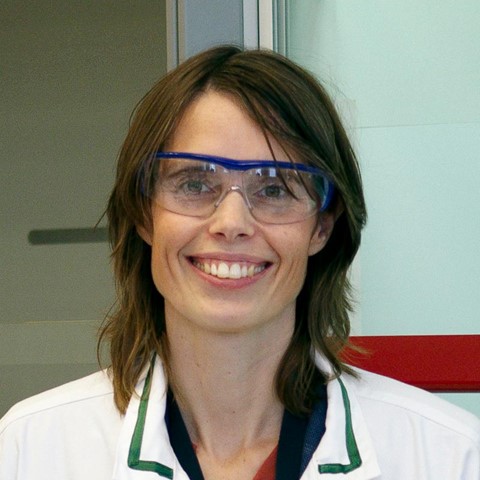
Karlijn Codée-van der Schilden
Karlijn Codée-van der Schilden (Haarlem, 1974) has been working at NRG since 2007 on the development of medical isotopes together with various Dutch and also foreign academic hospitals and centres. This led to the establishment of the FIELD-LAB consortium. Within FIELD-LAB, she is responsible for the collaboration projects with the academic partners.
Sander De Groot
Sander de Groot (Nijmegen, 1973) has been working at NRG since 2000 on the development of nuclear technology and infrastructure in Petten and nuclear technology product development for energy, industryl and medical aplications. In 2018, he became the manager of the NRG medical isotope development programme, from which FIELD-LAB also emerged.
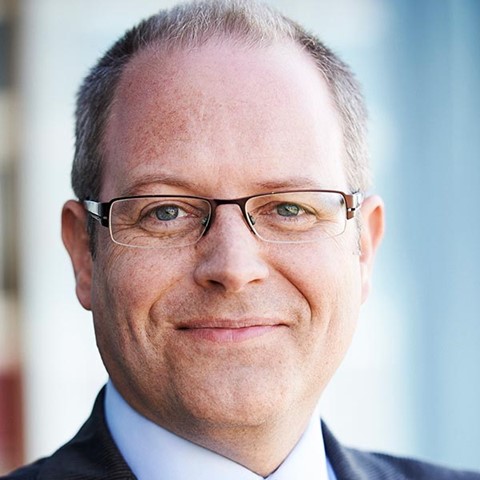
Interview
The project focuses on better custom-designed treatment. We assume that FIELD-LAB developed out of an earlier concept.How did the initiative start? Can a timeline be given?
NRG decided a few years ago to focus on the development of new medical isotopes and thus to expand its activities from radiation to making radiochemicals or radioactive raw materials for the production of radiopharmaceuticals. In it, we established partnerships with academic hospitals to develop radiopharmaceuticals together based on new, promising isotopes. We have discovered that this is a long process, in which the step towards clinical studies is also very big, especially given the high costs and limited availability of the correct facilities and isotopes. FIELD-LAB was established because of the need to accelerate development and keep it affordable.
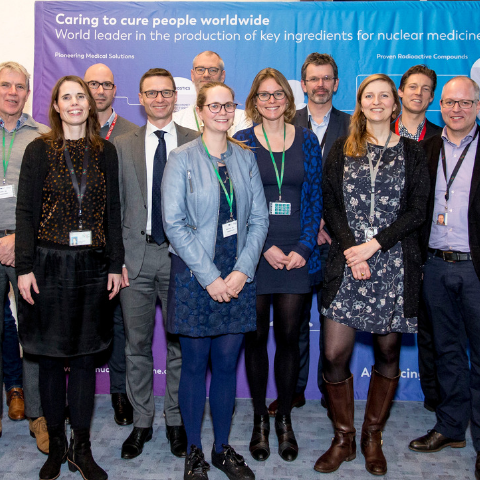
Group photo of the FIELD-LAB partners: NRG, PALLAS, Antoni van Leeuwenhoek/Netherlands Cancer Institute, Erasmus MC, Radboud UMC, Amsterdam UMC and Future Chemistry
The Petten site is unique as all the relevant links in the chain for the production of isotopes and radioactive raw materials are already in place. NRG intends to expand and upgrade the site. For many specialists involved in nuclear medicine, Petten has historically played a prominent role in the development of this field. What is or will be different from then?
Petten wants to continue playing this role. With FIELD-LAB we expand the possibilities by making high-quality products close to the reactor. We aim to accelerate the development of promising, new nuclear medicines and get more nuclear medicines into standard treatment. This is made possible by the small batches we can produce.
The project is founded on the creation of an efficient nuclear infrastructure according to the one-stop shop concept for the development and production of radioactive raw materials. What is the situation now, and what will make the difference?
The development of new radioactive raw materials has been going on for some time at NRG. But for clinical studies, GMP quality is preferred. Currently, therefore, a development requires finding several locations in the country to be able to make a product of the right quality. With the GMP facilities realised at Petten for FIELD-LAB, we can produce efficient, GMP-worthy nuclear material for clinical studies without involving transport and thus with minimal time loss. This will make more developments possible at an accelerated rate.
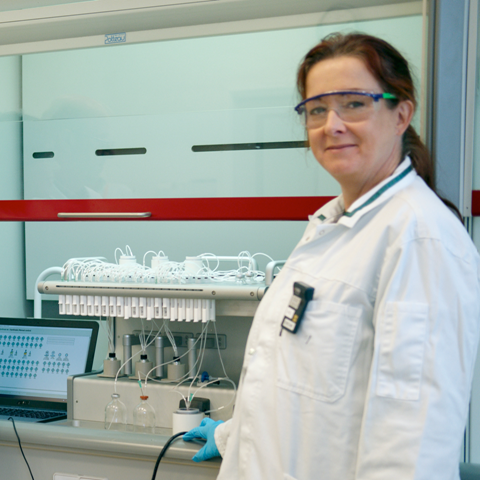
Oene Zwaagstra, Karlijn Codée-van der Schilden and Lida Magielsen are standing next to the CISSPECT DESK-LAB automatic module that was partly developed by this NRG research team. This module is employed within FIELD-LAB for a human study.
FIELD-LAB serves primarily to make GMP medicines for human use available faster. Will it also make a difference in the development of non-GMP radiochemicals for preclinical research?
FIELD-LAB we bring all of the parties together for a more efficient development of new nuclear medicines. Non-GMP radiochemicals are partly already available in FIELD-LAB, because we can use the existing infrastructure at Petten for them. On that basis, we can already support preclinical research.
Will only existing isotopes be able to be applied faster in FIELD-LAB, or can new isotopes also be used that are not yet standard in medical care?
FIELD-LAB is the incubator for new nuclear medicines. This includes isotopes that are not yet standard. FIELD-LAB will thus also make isotopes available that have a promising future ahead of them, but are currently little used in research because of their limited availability.
According to the project proposal, NRG wants to work with various university centres aiming to accelerate the introduction of new nuclear medicines for the personalised treatment of cancer patients, to set up a FIELD-LAB for multidisciplinary research and development and to make radioactive raw materials available for preclinical and clinical research.Will expansion of the possibilities to other centres be considered in a future phase? Will an expansion in a European context also be expected?
FIELD-LAB is available to everyone who wants to develop a product based on the isotopes of FIELD-LAB, for both R&D/preclinical phases and GMP production for clinical studies. We have started collaborating with parties that are close to NRG (also literally) and with which there was already a partnership, but we certainly expect expansion within and outside the Netherlands, as the interest expressed is great.
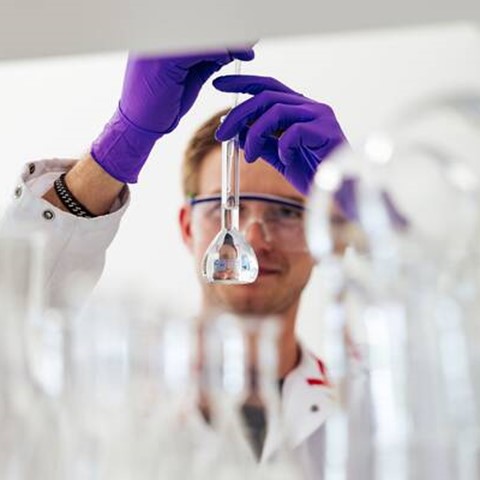
The initiative aims at collaboration with research departments of university medical centres. Will start-ups/spin-offs and existing pharmaceutical/radiopharmaceutical companies, both locally and abroad, also be involved
The aim of FIELD-LAB is to help accelerate the progress of new products through the clinical phases, so they can reach the market sooner. Start-ups/spin-offs and pharmaceutical companies play a crucial role in this and will therefore certainly also be involved in FIELD-LAB. The presence of a high-quality infrastructure, academic knowledge and market-oriented companies will be the power of FIELD-LAB.
This interview has been published in the Dutch Tijdschrift voor Nucleaire Geneeskunde (Journal for Nuclear Medicine) in the June edition 2019.
More information?
Do you wish to learn more on nuclear medicine and how FIELD-LAB can help you? Get in touch with us!

